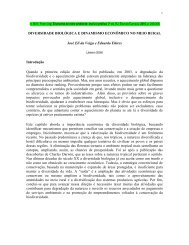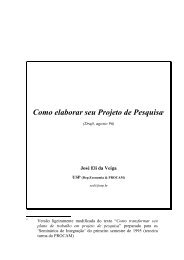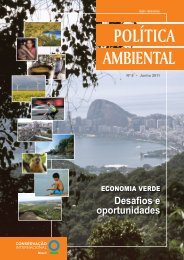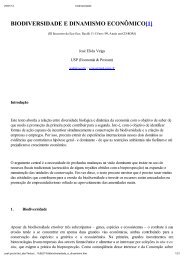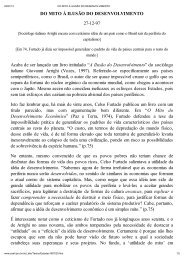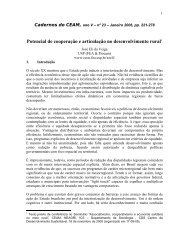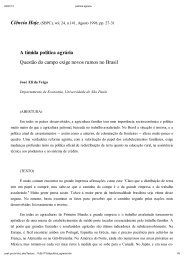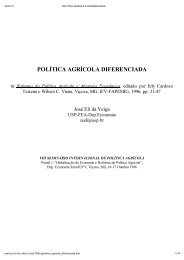sustainable development 20 years on from the ... - José Eli da Veiga
sustainable development 20 years on from the ... - José Eli da Veiga
sustainable development 20 years on from the ... - José Eli da Veiga
Create successful ePaper yourself
Turn your PDF publications into a flip-book with our unique Google optimized e-Paper software.
225<br />
c<strong>on</strong>sequence of <strong>the</strong> increasing use of informati<strong>on</strong> and communicati<strong>on</strong> technologies (ICTs) in productive<br />
processes, or in a transiti<strong>on</strong> towards a more envir<strong>on</strong>mentally friendly ec<strong>on</strong>omy.<br />
3. Informati<strong>on</strong> technologies and knowledge societies<br />
Over <strong>the</strong> last few <str<strong>on</strong>g>years</str<strong>on</strong>g>, Latin American and Caribbean countries have increased <strong>the</strong>ir ICT use in various<br />
fields. Access to <strong>the</strong>se tools is positive for envir<strong>on</strong>mental administrati<strong>on</strong> and management, since <strong>the</strong>y<br />
improve processes for generating, managing, integrating and exchanging informati<strong>on</strong> as a basis for<br />
decisi<strong>on</strong>-making in different spheres.<br />
Such progress raises new social and ethical resp<strong>on</strong>sibilities for scientists, technologists and<br />
decisi<strong>on</strong>-makers, to ensure that <strong>the</strong> technologies in questi<strong>on</strong> are applied in streng<strong>the</strong>ning efforts to achieve<br />
<str<strong>on</strong>g>sustainable</str<strong>on</strong>g> <str<strong>on</strong>g>development</str<strong>on</strong>g> targets. According to chapter 34 of Agen<strong>da</strong> 21, achieving <strong>the</strong>se targets requires<br />
available scientific knowledge and envir<strong>on</strong>mentally sensitive technologies to be applied to eradicate<br />
poverty and maintain ec<strong>on</strong>omic <str<strong>on</strong>g>development</str<strong>on</strong>g>, while at <strong>the</strong> same time addressing social priorities and<br />
protecting <strong>the</strong> envir<strong>on</strong>ment.<br />
In <strong>the</strong> envir<strong>on</strong>mental domain, ICTs have major potential <strong>on</strong> issues such as knowledge of<br />
ecosystems and natural resources, m<strong>on</strong>itoring of land-surface changes, land management, preventi<strong>on</strong> and<br />
management of disaster risk, or planning for infrastructure.<br />
The natural disasters that have occurred in <strong>the</strong> regi<strong>on</strong> in recent <str<strong>on</strong>g>years</str<strong>on</strong>g> have resulted in <strong>the</strong><br />
formati<strong>on</strong> of organizati<strong>on</strong>s that use spatial <strong>da</strong>ta infrastructures (SDIs) and innovati<strong>on</strong>s in remote sensing<br />
technologies, to generate and distribute <strong>da</strong>ta regi<strong>on</strong>ally, nati<strong>on</strong>ally and locally —with a clear focus <strong>on</strong><br />
preventi<strong>on</strong> or mitigati<strong>on</strong> of <strong>the</strong> effects of natural phenomena, events caused by human acti<strong>on</strong>, or global<br />
changes. These include <strong>the</strong> Central American Geographic Informati<strong>on</strong> Project, <strong>the</strong> Regi<strong>on</strong>al Programme<br />
for <strong>the</strong> Reducti<strong>on</strong> of Vulnerability and Envir<strong>on</strong>mental Degra<strong>da</strong>ti<strong>on</strong> (PREVDA), and <strong>the</strong> Central American<br />
Probabilistic Risk Assessment project, al<strong>on</strong>g with <strong>the</strong> Andean countries’ project Support for Disaster<br />
Preventi<strong>on</strong> in <strong>the</strong> Andean Community (PREDECAN), am<strong>on</strong>g o<strong>the</strong>rs. Paving <strong>the</strong> way for o<strong>the</strong>r similar<br />
initiatives requires better access to ICTs toge<strong>the</strong>r with specialized professi<strong>on</strong>al and technical pers<strong>on</strong>nel.<br />
As <strong>the</strong> public sector increases its use of ICTs, <strong>the</strong> supply of informati<strong>on</strong> and services improves. In<br />
<strong>the</strong> case of <strong>the</strong> envir<strong>on</strong>ment, this helps to increase <strong>the</strong> producti<strong>on</strong> of public informati<strong>on</strong> <strong>on</strong> <strong>the</strong> envir<strong>on</strong>ment<br />
and improve access to that informati<strong>on</strong>, which encourages greater citizen participati<strong>on</strong> in c<strong>on</strong>trolling <strong>the</strong><br />
implementati<strong>on</strong> of public policies, and greater exchange between governments (UNEP, <str<strong>on</strong>g>20</str<strong>on</strong>g>10a).<br />
The <str<strong>on</strong>g>development</str<strong>on</strong>g> of ICTs and <strong>the</strong>ir role in <strong>the</strong> sociocultural aspects of globalizati<strong>on</strong> gave birth to<br />
<strong>the</strong> c<strong>on</strong>cept of <strong>the</strong> informati<strong>on</strong> society. Then, over <strong>the</strong> last few <str<strong>on</strong>g>years</str<strong>on</strong>g>, <strong>the</strong> idea was overtaken by <strong>the</strong><br />
c<strong>on</strong>cept of knowledge societies, which encompass o<strong>the</strong>r social, ethical and political dimensi<strong>on</strong>s, because<br />
<strong>the</strong>y refer to a society that thrives <strong>on</strong> its diversities and capacities, while recognizing <strong>the</strong> importance of <strong>the</strong><br />
plurality of knowledge. Use of <strong>the</strong> word “societies” in <strong>the</strong> plural means that <strong>the</strong> c<strong>on</strong>cept rejects <strong>the</strong> idea of<br />
a unique “ready-to-use” model that takes insufficient account of cultural and linguistic diversity.



